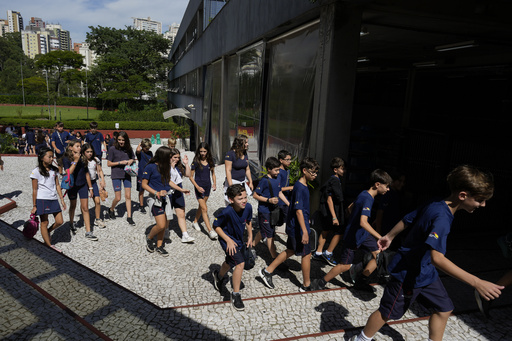
SAO PAULO — Brazilian students have returned to school with a new challenge: adhering to a law that limits the use of smartphones on campus. This legislation, signed by President Luiz Inácio Lula da Silva in January, aims to restrict smartphone access in both public and private educational institutions, covering classroom areas as well as hallways. This move is consistent with similar trends being observed in the United States and Europe.
While smartphones can still be utilized for educational purposes with permission from teachers, as well as for essential health and accessibility needs, individual schools have the freedom to determine their own policies regarding smartphone storage, such as keeping them in backpacks, lockers, or designated areas. Prior to the implementation of this federal regulation, many of Brazil’s 26 states—such as Rio de Janeiro, Maranhao, and Goias—had already established some limitations on phone use in schools.
A survey from the previous year showed that by 2023, approximately two-thirds of schools had some form of restrictions on smartphone usage, with 28% outright banning their use. However, the inconsistency of regulations across varying states and educational institutions posed challenges for enforcement. This discrepancy may have fueled a growing consensus across the Brazilian political spectrum, encompassing supporters of both Lula’s government and former far-right President Jair Bolsonaro. A recent poll indicated that nearly two-thirds of Brazilians favor banning smartphones for school-aged children, with an overwhelming majority believing these devices have a negative impact on kids.
Porto Seguro, a prestigious private school in Sao Paulo with a history of nearly 150 years, implemented a ban on smartphone use in classrooms last year. Additionally, the school mandated that students refrain from using their phones during breaks, pushing them to store their devices in lockers. Principal Meire Nocito shared that many students struggled with maintaining concentration and found socializing difficult due to excessive phone use, often isolating themselves at school by engaging mainly through social media.
“By prohibiting cellphone use, we have fostered a more socially interactive environment where students can develop relationships and learn how to deal with conflicts, which are natural aspects of human interaction,” Nocito remarked. She expressed that the ban has created a positive change in the school community.
Brazil’s Ministry of Education recently affirmed that this restriction is designed to safeguard students’ mental and physical health while encouraging responsible technology usage. Statistically, Brazil has more smartphones in circulation than its population, with figures reaching 258 million devices for 203 million inhabitants. Reports suggest that Brazilians spend an alarming average of over nine hours daily on screens, a prominent global statistic.
Concerns regarding children’s smartphone usage have been widely voiced by educational institutions, governments, and parents, linking it to issues such as bullying, anxiety, suicidal thoughts, and impaired learning focus. Countries like China and France have taken strategic steps, with China imposing restrictions and France prohibiting smartphone use in schools for children aged six to 15. In the United States, several states have enacted laws or policies to limit smartphone access to reduce distractions in classrooms.
Moreover, there is a growing movement among European parents who worry about the adverse effects of smartphone use on their children’s safety and mental health. A recent UNICEF report indicated that one out of four countries has already enacted restrictions on phone use in educational settings.
Mark Zuckerberg, CEO of Meta, acknowledged at a U.S. Senate hearing the challenges parents face with children encountering bullying and exploitation through social media platforms. He reiterated the company’s commitment to enhancing children’s protection online.
Thirteen-year-old student Mariana Waetge, a long-time smartphone user, reflected on her experiences, stating that the restriction has enabled her to explore alternative ways of connecting with friends, enhance her focus, and even improve her family relationships. She noted that for students previously using their devices to avoid social interactions, this ban has encouraged them to engage with classmates through board games and reading.
In summary, the new law restricting smartphone use in Brazilian schools is being implemented with the intent of promoting mental well-being and facilitating social interactions among students.

